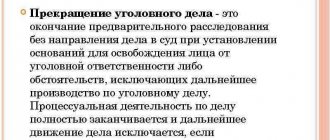Commentary on Article 217 of the Code of Criminal Procedure of the Russian Federation
1. The article under comment contains rules for familiarizing the accused and his defense attorney with the materials of the criminal case at the end of the preliminary investigation. Familiarization is carried out after the requirements of Art. 216 of the Code of Criminal Procedure of the Russian Federation, i.e. when the victim, civil plaintiff, civil defendant or their representatives were familiarized with the materials. Moreover, the accused and his defense attorney are also familiarized with the protocols for familiarizing themselves with the materials of the criminal case of the persons specified in Art. 216 of the Code.
2. Unlike the interested parties specified in Art. 216 of the Code of Criminal Procedure of the Russian Federation, the accused and his defense attorney get acquainted with the materials of the criminal case without an additional petition. The investigator is entrusted with the obligation to present the accused and his defense attorney with the filed and numbered materials of the criminal case, and the defendant and his defense attorney, at their own discretion, either begin to familiarize themselves or refuse to do so.
3. The refusal of the accused to familiarize himself with the materials of the criminal case does not relieve the investigator from the obligation to provide them to the defense attorney.
4. Also, along with the criminal case, material evidence is presented for review (Articles 81–82 of the Code of Criminal Procedure of the Russian Federation). If, due to their cumbersome nature or for other reasons, it is impossible to present material evidence, then the investigator makes a decision to this effect. Among other information, the resolution must contain specific reasons why it is not possible to present material evidence for review.
5. The accused and his defense attorney are not presented only with those materials that were compiled in connection with the need to ensure the safety of the victim, his representative, a witness, their close relatives, relatives and close persons (Part 9 of Article 166 of the Code of Criminal Procedure of the Russian Federation). To do this, a resolution containing the reasons for the decision to keep personal information secret is placed in an envelope, which is sealed and attached to the criminal case. When familiarizing the accused and his defense attorney with the materials of the criminal case, the investigator must ensure that this envelope is not unsealed and the participants in the criminal proceedings do not familiarize themselves with its contents.
6. If technical means were used during investigative actions, then appendices to the relevant protocols are presented for review at the request of the accused and his defense attorney. The fact of the presence or absence of a request must be recorded in the review protocol.
The exception is cases when photography was taken, since its results are drawn up in the form of photo tables, filed with the criminal case and numbered with a general number along with other materials. Therefore, their presentation occurs simultaneously with the presentation of all materials of the criminal case.
7. As a general rule, the accused and his defense attorney familiarize themselves with the materials of the criminal case together. Separate familiarization is allowed only in cases where a written request has been received. Part 1 of the commented article contains a not entirely clear indication that separate familiarization occurs “at the request of the accused and his defense attorney.” In this case, petitions must be submitted either by both participants in criminal proceedings, or by one of them, and the second must mark their consent on it.
8. Familiarization of the accused with the materials of the criminal case separately with the defense lawyer in the absence of their consent to this is recognized as a significant violation of the requirements of the law.
9. When a crime is committed by complicity, the investigator independently determines the order in which the accused and their defense attorneys will familiarize themselves with the materials of the criminal case. In this case, the investigator can find out from the accused and their defense attorney(s) which order seems optimal for them. Each subsequent accused and his defense attorney are familiarized with all materials, including protocols for familiarization with the materials of the criminal case of previous accomplices, as well as the content of their petitions and the results of permits (if any).
10. Failure to familiarize all accused with the materials of the criminal case is a significant violation of the law.
11. The sequence of familiarization with the materials of the criminal case is determined by the accused himself and his defense attorney. At the same time, they have the right to repeatedly refer to those materials that they consider necessary to study further. There is also no limit on the amount of information that they have the right to extract from a criminal case and record on various media, including using technical means.
12. The exception is information that constitutes a state or other secret protected by law. Copies can also be made of such documents, but taking them with you is prohibited. They are provided to the accused and his defense counsel only during the trial. Since participants in criminal proceedings on the part of the defense must be provided with appropriate conditions to prepare for the trial, these materials are provided to them at their request and before the start of the trial.
13. The provision of part 2 of the commented article, which establishes an exception to the general rules established by law, cannot be considered as allowing the seizure and storage in a criminal case of all copies of documents and extracts made by the accused and his defense attorney, regardless of whether they cover information constituting state or other secret protected by federal law, with the exception of the case when all materials of the criminal case are recognized as secret by a reasoned decision.
14. According to part 3 of the commented article, the time for familiarization of the accused and his defense attorney with the materials of the criminal case is not limited. This applies to cases when the accused and his defense attorney get acquainted with the materials of the criminal case, both together and separately.
15. At the same time, the legislator has established the possibility of limiting the time of familiarization when these participants are clearly delaying this process. In this case, the investigator applies to the court with a petition, and the district court judge sets a sufficient period. The investigator records the time of familiarization with the materials of the criminal case in the familiarization schedule. If the persons have not familiarized themselves within this period, then the investigator completes the familiarization, makes an appropriate note in the protocol of familiarization with the materials of the criminal case, and then sends the criminal case to the court. The accused and his defense attorney have the opportunity to familiarize themselves with the materials of the criminal case directly in court, as well as make copies of procedural documents.
16. When setting a deadline for familiarizing yourself with the materials of a criminal case, a judge is obliged to provide factual and legal justification for such a decision, which, in order to ensure objectivity and fairness, in any case must be motivated by references to specific circumstances, as well as to the norms of substantive and procedural law. When the court determines the period for completing familiarization with the materials of the criminal case, the provisions of Part 3 of Art. 164 of the Code of Criminal Procedure of the Russian Federation, which prohibits investigative actions at night, except in urgent cases.
16. Parts 4–5 of the commented article impose on the investigator the obligation to explain to the accused and his defense attorney their right to submit petitions and other statements. In addition, these participants are asked which persons, in their opinion, should be summoned to the court hearing. Subsequently, these persons are included in the list of persons subject to summons by the defense (Part 4 of Article 220 of the Code of Criminal Procedure of the Russian Federation).
17. The accused may file a petition to have a criminal case considered by a court with the participation of a jury only if the criminal case can be considered by this composition of the court in accordance with the rules established in paragraph 1 of Part 1 of Art. 31 Code of Criminal Procedure of the Russian Federation. The responsibility to explain this right when the elements of crimes of which a person is accused coincide with those that are within the jurisdiction of a jury trial is assigned to the investigator.
18. If several persons are brought as defendants in a criminal case, then only those of them who are accused of committing these crimes have the right to petition for the case to be considered by a court with the participation of a jury.
When familiarizing the accused with the materials of the criminal case, the investigator is obliged to explain to him not only the right to petition for a trial of his case by a court with the participation of a jury, but also the peculiarities of the consideration of a criminal case by this court, the rights of the accused in the trial and the procedure for appealing a court decision, which is stated in the protocol record and reflects the position of the accused on this issue.
In cases where one or more defendants have submitted a request for a criminal case to be considered by a jury, and the rest have refused such a jury, and also when one or more defendants are minors, the investigator must separate the criminal cases against these defendants into separate proceedings. .
The investigator must act similarly in the cases specified in paragraph 11, part 5 of the commented article (if it is possible to consider a criminal case by a panel of 3 judges of a federal court of general jurisdiction).
19. Failure of the investigator or interrogating officer to fulfill the obligation to explain to the accused the right to petition, when familiarizing himself with the materials of the criminal case, for the application of a special procedure for trial, provided for in Chapter. 40 of the Code of Criminal Procedure of the Russian Federation entails a violation of the accused’s right to defense and in accordance with paragraph 5 of Part 1 of Art. 237 of the Code is the basis for holding a preliminary hearing to decide the issue of returning the criminal case to the prosecutor.
20. If, upon familiarization with the materials of the criminal case, the accused filed a petition for the application of a special procedure for trial, but at the same time expressed disagreement with the charge brought against him, then the criminal case is sent to the court for consideration in the usual manner.
21. The criminal procedural law does not require that the person’s will to exercise (or not exercise) each of the rights provided for in Part 5 of the commented article be reflected in the protocol of familiarization with the materials of the criminal case.
22. The accused himself, but not his defense attorney, has the right to petition for the implementation of the actions specified in part 5 of the commented article. These participants have the right to discuss among themselves one or another version of their actions, but it is the accused who submits the official petition.
23. The decision to separate a criminal case in connection with the choice of one of the accused to trial with a jury is made only by the investigator if the petition was filed before the criminal case was sent to court. If such a petition is filed after the criminal case has been sent to court, then the case is considered by the court with the participation of a jury, regardless of the objection of the other accused (Part 2 of Article 325 of the Code of Criminal Procedure of the Russian Federation).
24. The accused has the right to make a request for a criminal case to be considered by a court with the participation of a jury both when familiarizing himself with the materials of the criminal case at the end of the preliminary investigation, and after sending the criminal case to the court, but before scheduling a court hearing to consider the case on the merits.
Everything about criminal cases
Go to the text of the Code of Criminal Procedure
Url Additional information:
Familiarization of the accused with the case materials
— Part 1 217 Code of Criminal Procedure
The investigator presents to the accused:
— Part 1 217 Code of Criminal Procedure
filed and numbered case materials
— Part 1 217 Code of Criminal Procedure
do not present information hidden for security reasons (
166 Code of Criminal Procedure
)
— Part 1 217 Code of Criminal Procedure
you can meet separately
— Part 1 217 Code of Criminal Procedure
if there are several accused, the order is determined by the investigator
Evidence
— Part 1 217 Code of Criminal Procedure
material evidence is presented
— Part 1 217 Code of Criminal Procedure
photos, videos are provided upon request
— Part 1 217 Code of Criminal Procedure
if it is impossible to present, a decision is made
Rights upon review
— Part 2 217 Code of Criminal Procedure
during the familiarization process, the right to:
— Part 2 217 Code of Criminal Procedure
revisit any of the volumes
— Part 2 217 Code of Criminal Procedure
write out any information, in any volume
— Part 2 217 Code of Criminal Procedure
make copies
— Part 2 217 Code of Criminal Procedure
copies containing secrets are provided only at trial
Delaying familiarization
— Part 3 217 Code of Criminal Procedure
the defense side cannot be limited in time
— Part 3 217 Code of Criminal Procedure
when delayed, a deadline is set
— Part 3 217 Code of Criminal Procedure
the deadline is set by the court
— Part 3 217 Code of Criminal Procedure
if the deadline is ignored, familiarization is completed
I). General petitions
— Part 4 217 Code of Criminal Procedure
it becomes clear what petitions are available (any)
— Part 4 217 Code of Criminal Procedure
it is clarified which persons are to be called (witnesses, experts)
II). Special requests
— Part 5 217 Code of Criminal Procedure
The right to submit petitions is explained separately:
— Clause 1 Part 5 217 Code of Criminal Procedure
right to request a jury trial
— clause 1.1 part 5 217 Code of Criminal Procedure
the right to petition for a case to be heard by 3 judges
— Clause 2 Part 5 217 Code of Criminal Procedure
right to apply for special treatment
— Clause 3 Part 5 217 Code of Criminal Procedure
right to request a preliminary hearing
Familiarization with the case
Familiarization with the case
post-investigation: practical aspects
Attaching documents when familiarizing yourself with the case
How to include
conclusion of a specialist on the materials of a criminal case?
Article 217 of the Code of Criminal Procedure. Familiarization of the accused and his defense attorney with the materials of the criminal case
1) After fulfilling the requirements of Article 216 of the Code of Criminal Procedure, the investigator presents to the accused and
his defense attorney:
- filed and numbered materials of the criminal case,
Url Additional information:
Regulatory framework on security measures
- Part 3 11 Code of Criminal Procedure
security measures for participants in the process
- Part 4 35 Code of Criminal Procedure
change of territorial jurisdiction in case of security threat
Rights of participants in the process to security
- clause 21 part 2 42 Code of Criminal Procedure
the right of the victim to request security measures
- paragraph 15
Plenum No. 17, the victim has the right to request security measures
— clause 7, part 4 56 Code of Criminal Procedure
right of a witness to request security measures
- Part 1.1 144 Code of Criminal Procedure
right to safety of a participant in pre-trial proceedings
Security measures during investigation and trial
- Part 9 166 Code of Criminal Procedure
maintaining the confidentiality of the data of a witness or victim in the protocol
- Part 8 193 Code of Criminal Procedure
identification for security - without visual observation
- Part 8 208 Code of Criminal Procedure
security measures when suspending a case
- Part 6 213 Code of Criminal Procedure
security measures in case of termination of the case during the investigation
— Part 1 217 Code of Criminal Procedure
when familiarizing yourself with the case, some information may not be presented
- Part 5 239 Code of Criminal Procedure
security measures in case of dismissal of the case in court
- clause 4 part 2 241 Code of Criminal Procedure
closed proceedings if security is affected
- Part 5 278 Code of Criminal Procedure
interrogation of a witness without disclosing his identity for security reasons
- Part 4 303 Code of Criminal Procedure
Personal information may be hidden under pseudonyms
PRACTICAL Aspects
Security measures
participants in the process - how to use it for protection
- except for the cases provided for in Part 9 166 of the Code of Criminal Procedure.
Material evidence is also presented for review,
- and at the request of the accused or his defense attorney, photographs, audio and (or) video recordings, filming and other attachments to the investigative protocols.
If it is impossible to present material evidence, the investigator makes a decision to this effect.
At the request of the accused and his defense attorney, the investigator provides them with the opportunity to familiarize themselves with the materials of the criminal case separately.
If several defendants are involved in a criminal case, the sequence of providing them and their defense attorneys with the materials of the criminal case is established by the investigator.
2) In the process of familiarizing themselves with the materials of a criminal case, consisting of several volumes, the accused and his defense attorney have the right to:
- re-apply to any of the volumes of the criminal case,
- as well as write out any information and in any volume,
— make copies of documents, including using technical means.
Copies of documents and extracts from a criminal case containing information constituting a state or other secret protected by federal law:
- stored in a criminal case,
- and are provided to the accused and his defense attorney during
the trial.
3) The accused and his defense attorney cannot be limited in the time they need to familiarize themselves with the materials of the criminal case.
If the accused and his defense attorney, who have begun to familiarize themselves with the materials of the criminal case, clearly delay the time of familiarization with these materials, then a certain period is established for familiarizing themselves with the materials of the criminal case.
The period is set on the basis of a court decision made in accordance with Article 125 of the Code of Criminal Procedure.
If the accused and his defense attorney, without good reason, have not familiarized themselves with the materials of the criminal case within the time period established by the court, the investigator has the right to decide to end the proceedings of this procedural action, about which he issues a corresponding resolution,
- and makes a note in the protocol of familiarization of the accused and his defense attorney with the materials of the criminal case.
Url Additional information:
- P.
Upon review of the standard, the lawyer is required to file motions
Addition to the investigation
- Part 2 159 Code of Criminal Procedure
investigative actions cannot be refused
Attaching documents
- Part 2.2 159 Code of Criminal Procedure
evidence cannot be refused
Decision on petitions
— 219 Code of Criminal Procedure
resolution of petitions filed during familiarization with the case
Attaching documents when familiarizing yourself with the case
How to include
conclusion of a specialist on the materials of a criminal case?
General requests
General requests
: calling witnesses, supplementing the investigation, examination, etc.
4) After the accused and his defense attorney have familiarized themselves with the materials of the criminal case, the investigator finds out what petitions or other statements they have.
Url Additional information:
- Part 4 220 Code of Criminal Procedure
list of persons to be summoned to court
— Clause 4 Part 2 231 Code of Criminal Procedure
decision to call witnesses when scheduling a meeting
At the same time, it becomes clear from the accused and his defense attorney which persons are subject to being summoned to the court hearing for questioning and confirmation of the
defense’s position:
- witnesses,
- experts,
Url Additional information:
Engaging a specialist
- part 1 144 of the Code of Criminal Procedure
the involvement of specialists is possible before the initiation of a case
- Part 1 168 Code of Criminal Procedure
involvement of a specialist during the investigation
— Part 4 217 Code of Criminal Procedure
petition to call specialists to familiarize themselves with the case
— 251 Code of Criminal Procedure
participation of a specialist in the judicial stage
- paragraph 19
Plenum No. 28 calling a specialist to evaluate the expert’s opinion
Interrogation in court
- paragraph 19
Plenum No. 28 calling a specialist to evaluate the expert’s opinion
— P.
Plenum No. 51 interrogation of a specialist in court
The court has no right to refuse
- Part 2.1 58 Code of Criminal Procedure
the right of the defense to call a specialist; the court has no right to refuse
— Part 4 271 Code of Criminal Procedure
the court has no right to refuse to interrogate a specialist who has appeared
- paragraph 22
Plenum No. 28, the court has no right to refuse to interrogate a specialist
— P.
Plenum No. 51, the court has no right to refuse to interrogate a specialist
Expert opinion
- Part 2.2 159 Code of Criminal Procedure
you cannot refuse to include a specialist’s opinion
— clause 6
Plenum No. 28 use in proving a specialist’s conclusion
Practical aspects
Participation of a specialist
in criminal proceedings, from the prosecution and defense
- specialists.
Url Additional information:
- Part 2 218 Code of Criminal Procedure
an entry is made in the protocol explaining the rights
— Clause 5 Part 1 237 Code of Criminal Procedure
failure to explain rights entails the return of the case by the prosecutor
Special requests
Special requests
: special order, jury trial, etc.
5) The investigator explains to the accused his right to petition:
Url Additional information:
Jury trial
— Clause 2 Part 2 30 Code of Criminal Procedure
regional judge and 8 jurors
— clause 2.1 part 2 30 Code of Criminal Procedure
district judge and 6 jurors
— Part 2 47
Constitutional right to trial by jury
Clarification of rights
— P.
Plenum No. 23 clarification of rights should be detailed
1).
on the consideration of a criminal case by a court with the participation of a jury - in cases provided for in paragraph 2, part 2, 30 of the Code of Criminal Procedure.
At the same time, the investigator explains the peculiarities of the consideration of the criminal case by this court, the rights of the accused in the trial and the procedure for appealing the court decision. Url Additional information:
— P.
Plenum No. 23 separating the case against those who do not want a jury trial
If one or more accused refuses to be tried by jury
, the investigator decides to separate the criminal cases against these accused into separate proceedings.
If it is impossible to separate a criminal case into separate proceedings, the criminal case as a whole is considered by the court with the participation of a jury;
1.1). on the consideration of a criminal case by a panel of 3 judges of a federal court of general jurisdiction - in cases provided for in paragraph 3, part 2, 30 of the Code of Criminal Procedure;
Url Additional information:
- Part 4 219 Code of Criminal Procedure
the victim is notified of the request for a special order
— clause 11
Plenum No. 28 failure to clarify the right to a special procedure - return of the case
— clause 4
Plenum No. 60 failure to clarify the right to a special procedure - return to the prosecutor
Petition for special order
Moment to Submit
requests for special treatment
Statement
Statement
about the trial in a special order at the investigation stage (
clause 2, part 5 217 of the Code of Criminal Procedure
)
2). on the application of a special procedure for judicial proceedings - in cases provided for by 314 Code of Criminal Procedure;
Url Additional information:
Request for Preliminary Hearing
— Clause 3 Part 5 217 Code of Criminal Procedure
clarifies the right to apply for preliminary hearing
- Part 2 218 Code of Criminal Procedure
the protocol indicates a record of clarification of rights from
Part 5 217 of the Code of Criminal Procedure
- Part 3 229 of the Code of Criminal Procedure
petition after familiarization with the case materials
Petition
First moment
to file a motion for a preliminary hearing
TIPS ( VIP
-part of the site)
How to submit
request for a preliminary hearing and avoid mistakes
3). on holding preliminary hearings - in cases provided for by 229 Code of Criminal Procedure.
Return to the text of the Code of Criminal Procedure
Seek advice
What does judicial practice show under this article?
The need to become familiar with the procedural papers can be considered using the trivial example of Article 111 of the Criminal Code of the Russian Federation. Citizen Petrov was brought to justice for beating his friend in a dark alley. On the eve of the event, Petrov, the victim and another acquaintance, Lavrov, were drinking alcohol. Lavrov and the accused Petrov quarreled. Lavrov left in a fit of anger and left the accused and the victim alone.
The men, having finished their alcohol, decided to continue the celebration and went to the store. According to the case file, on the way the men quarreled, and the accused beat his comrade half to death, after which he ran away. The materials also contain testimony from witness Lavrov, a third comrade who saw Petrov beating the victim. The accused claims that he did not do this, he allegedly went to the store and left his friend on the street, and when he returned, he was no longer there. Accordingly, he went home, deciding that the holiday was over.
The procedure for interrogating an accused in criminal proceedings and the time limits under the Code of Criminal Procedure, Article 173
In the process of studying the criminal case, the accused, together with his lawyer, identified an inconsistency in the testimony of a witness who initially indicated that he had gone home, but then turned out to be an eyewitness to the incident. The witness lives on the other side of the city, so he physically would not have had time to go home and then return to the scene and notice the fight.
The investigator was informed of the inaccuracies and the witness was interrogated again. During the interview, the investigator identified a lie on the part of Lavrov, who harbored a grudge against Petrov, and thus decided to take revenge on him. Since there was no other strong evidence against Petrov, and the victim did not see the attacker, criminal prosecution against him was stopped, and Lavrov was prosecuted for false denunciation and slander. Thus, a careful study of the case saved a person from punishment for an uncommitted crime.
What decisions can be made under Article 217 of the Code of Criminal Procedure?
Judicial practice in the matter of familiarization with case materials is quite monotonous. All the people who had read the indictment and the evidence base in advance understood the essence of the problem and at the court hearing did everything possible to avoid punishment.
At the same time, people who refused to familiarize themselves with the documents were unable to exercise their legal rights and defend themselves properly at the court hearing, which led to what they considered to be an unlawful verdict and many disputes and appeals.
None of the controlling authorities can deny the legal right of a party to the process to familiarize themselves with the materials of the criminal case. If such a situation exists, it is necessary to file a complaint with higher management.
It should be noted that the accused may refuse to familiarize himself with the case materials; this does not entail any penalties for him, and is not a reason for postponing the trial. The court hearing takes place as usual, just one of the procedural stages is omitted.






